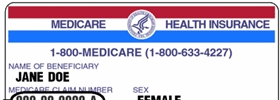Medicare cards will no longer use Social Security numbers as required  by a measure in the big Medicare bill signed by President Obama last week. Since its inception, Medicare has used beneficiaries’ Social Security numbers as a part of the Medicare claim number, which is displayed on the red, white and blue Medicare card.
by a measure in the big Medicare bill signed by President Obama last week. Since its inception, Medicare has used beneficiaries’ Social Security numbers as a part of the Medicare claim number, which is displayed on the red, white and blue Medicare card.
Medicare has four years to implement this large change for new Medicare beneficiaries that sign up for Medicare. Medicare has four additional years to replace existing Medicare beneficiaries cards with a new randomly-generated Medicare claim number. This means that, according to the new bill, Medicare has eight years to fully implement this change.
This change is a result of the increasing incidence of identity theft and need to provide protection for beneficiaries’ Social Security numbers. Most other health insurance companies and programs have long since abandoned the practice of using Social Security numbers as the identifying marker on ID cards, including Medicare Advantage plans (privatized Medicare plans).
The change will, of course, be very costly to implement, and Congress has provided $320 million over four years to implement. This money will come from Medicare trust funds which are financed with payroll taxes and other beneficiary premiums.
Currently, over 4,500 people a day sign up for Medicare, and it is expected that 18 million more people are expected to qualify for Medicare in the next decade. Many new Medicare beneficiaries have been shocked, in today’s climate of identity theft, to find that their Social Security numbers are prominently displayed on their Medicare cards, so this will be a welcome change.
Secure Medicare Solutions client, Larry Williamson, said of the change, “I think it’s high time Medicare caught up with most other organizations that have ceased using Social Security numbers as ID numbers. Medicare cards are cards that you have to have in your wallet, and using the Social Security number just opens you up for the possibility of theft or abuse.”
The plan right now is for Medicare to begin using randomly-generated Medicare claim numbers, which will still be displayed on beneficiaries’ Medicare cards but will not provide the same vulnerability to hackers and thieves.
Garrett Ball owns Secure Medicare Solutions, which is an independent Medicare insurance agency. If you have questions about this change or want additional information, you can contact us here.
